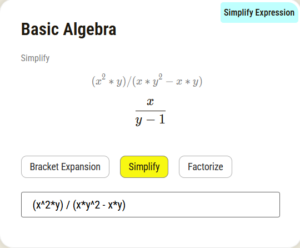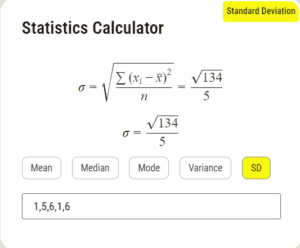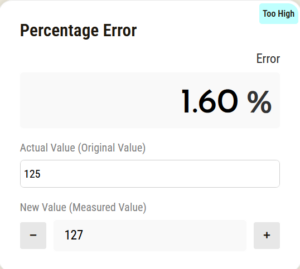Quadratic Equation Calculator
1. Identify the quadratic equation in standard form: ax^2 + bx + c = 0
2. Determine the values of a =?, b =?, c =?
3. Use the quadratic formula to find the solutions (roots) of the equation: x = \frac{-b \pm \sqrt{b^2 - 4ac}}{2a}
4. Calculate the value under the square root: b^2 - 4ac
5. Determine if the value under the square root is positive, negative, or zero. This will determine how many real solutions exist for the equation:
a. If b^2 - 4ac > 0 there will be two distinct real roots
b. If b^2 - 4ac = 0 there will be one real root (also known as a repeated root).
Learn More About Quadratic Equation Calculator
CalculatorCrave quadratic equations calculator is a convenient tool for quickly solving quadratic equations with ease. Simply input the coefficients of your equation and let the calculator do the work for you.
What is quadratic equation?
x=\frac{-b\pm\sqrt{b^2-4ac}}{2a}
A quadratic equation is an algebraic equation of the second degree, written in the form ax^2 + bx + c, where 'a' and 'b' are coefficients, 'x' is the variable, and 'c' is a constant. The term "quadratic" comes from the Latin word "quadratus," which means "square," indicating that the variable is squared (order 2) in this type of equation.
When it comes to understanding quadratic equations, the quadratic formula is a crucial tool. This formula helps solve quadratic equations by providing the roots or solutions for the equation. It is considered one of the top formulas in mathematics, as it is essential for solving various mathematical problems involving quadratic functions and equations.
Conditions for real solutions
If a, b, c are real and if D = b2 − 4ac is the discriminant, then the roots are
a. If b^2 - 4ac > 0 , there will be two distinct real roots.
b. If b^2 - 4ac = 0 , there will be one real root (also known as a repeated root).
c. If b^2 - 4ac < 0, there will be no real roots (two complex roots).
Solving quadratic equations
1. Solve the quadratic equation: x^2 + 6x + 9 = 0
Solution:
This equation can be factored as (x + 3)^2 = 0
Taking the square root of both sides, we get:
x + 3 = 0
x = -3
Therefore, the solution to the equation is x = -3.
2. Solve the quadratic equation: 2x^2 - 5x + 2 = 0
Solution:
This equation can be factored as (2x - 1)(x - 2) = 0
Setting each factor to zero, we get:
2x - 1 = 0 or x - 2 = 0
2x = 1 or x = 2
x = 1/2 or x = 2
Therefore, the solutions to the equation are x = 1/2 and x = 2.
3. Solve the quadratic equation: x^2 - 4x - 5 = 0
Solution:
Using the quadratic formula, x = (-(-4) ± √((-4)^2 - 4(1)(-5))) / 2(1)
x = (4 ± √(16 + 20)) / 2
x = (4 ± √36) / 2
x = (4 ± 6) / 2
x = (4 + 6) / 2 or (4 - 6) / 2
x = 10 / 2 or -2 / 2
x = 5 or -1
Therefore, the solutions to the equation are x = 5 and x = -1.
Practice Questions:
1. Solve the quadratic equation: x^2 - 9x + 20 = 0
2. Solve the quadratic equation: 3x^2 + x - 4 = 0
3. Solve the quadratic equation: x^2 + 10x + 21 = 0
4. Solve the quadratic equation: 4x^2 - 12x + 9 = 0
5. Solve the quadratic equation: 2x^2 + 7x + 3 = 0
6. Solve the quadratic equation: x^2 - x - 6 = 0
7. Solve the quadratic equation: 5x^2 + 4x - 12 = 0
8. Solve the quadratic equation: 2x^2 - 3x - 2 = 0
9. Solve the quadratic equation: x^2 + 8x + 16 = 0
10. Solve the quadratic equation: 3x^2 - 13x + 4 = 0









